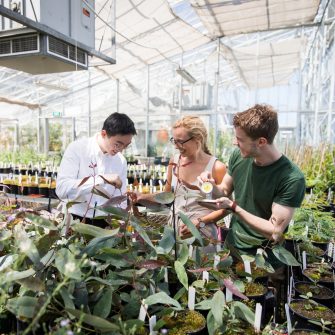Bachelor of Engineering (Honours) (Materials Science & Engineering)
- Commencing Terms
- Term 1, 2 & 3
- Duration
- 4 Year(s)
- Delivery Mode
- Face-to-face (includes blended)
- Campus
-
Kensington
- Codes
- UAC code 429600
- Program code 3131
- CRICOS code 088873A
-
ATAR/2025 lowest selection rank
- 85.0 View all admission criteria
-
2026 Indicative first year full fee
- $8,500*
-
2026 Indicative full fee to complete degree
- $37,500*
-
2026 Indicative first year full fee
- $62,000*
-
2026 Indicative full fee to complete degree
- $268,000*
Application closures for 2026
International applications for all undergraduate programs, as well as postgraduate programs offered by the faculties of Arts, Design & Architecture, Engineering (excluding Master of Information Technology and associated programs) and Science are now closed to New Overseas Student Commencement (NOSC) for 2026 intakes.
Postgraduate programs offered by the Business School and the faculties of Law & Justice and Medicine & Health remain open. Master of Information Technology (and associated programs) also remain open.
- Overview
- Entry requirements
- What will I study?
- Future careers
- Double degrees
- Double degrees
- How to apply
- Fees & Scholarships
Overview
Wondering what Materials Science and Engineering is all about? Materials Science and Engineering (MSE) studies materials and how they can be used to create new products or improve existing ones. You'll combine study in physics, chemistry and engineering to understand the properties of materials and how we can alter them to meet specific needs.
Everything around us, from metal and plastic to glass and ceramics, is made of materials - meaning materials engineers and scientists are involved in every aspect of technology. When you study Materials Science and Engineering, you can work on designing new materials for use in electronic circuits, electric vehicles, water purification systems, medical implants, and green energy generation and storage. Qualified Materials Science Engineers and professionals also work towards environmental progress by developing sustainable processes and recyclable eco-friendly products. Developing products for healthy living, sustainability and environmental responsibility are core concepts in materials development and application.
Materials Science and Engineering is leading the way in developments that will improve our environment, health, standard of living, national security, and economic prosperity. This is one of the most contemporary degrees of its kind in Australia, with a strong emphasis on societal impact.
During your degree you'll gain the necessary professional and sustainable mindset required for a successful career as a materials engineer. Your study combines lectures, practical hands-on laboratory work, research and design projects. To give you a holistic skillset, you'll study professional communication, computing, data analytics, engineering management, materials life cycle assessment and industry training.
Key features
- A strong emphasis on societal impact
This degree has been designed to give students a contemporary and socially relevant education in materials and processes based on how they impact the world. A range of new societal impact electives highlight the design and application of materials in critical areas such as medicine and health, electronics and communications, transportation and infrastructure, energy and the environment.
- Fully accredited degree
This degree is accredited by Engineers Australia, the largest professional body for engineers in the country. Through your membership with Engineers Australia, you'll connect with over 100,000 professionals and enjoy the benefits of being connected to the biggest advocate for your future profession. Additionally, your degree is internationally recognised through the Washington Accord, enabling you to work as a professional engineer in every major country in the world.
- Practical training
Industrial training gives you the opportunity to put what you learn into practice and develop technical, interpersonal and communication skills. It’s also an opportunity for employers to make early assessments of potential future employees. You'll complete 12 weeks of practical training meaning you'll have significant work experience under your belt when you graduate. The connections you make during your training can offer a competitive edge when applying for jobs.
- Double degree options
Depending on the nature of the industry you wish to work in, you may need to specialise further in areas such as biomedical or chemical engineering, computing, law, business, or finance through double degree programs. This degree can therefore be taken with commerce, chemical engineering, or the Master of Biomedical Engineering.
Why study at UNSW?
Study with the best
UNSW Science is ranked #1 in Australia #27 globally for materials science (QS World University Rankings by Subject, 2025). The School of Materials Science and Engineering is uniquely positioned to shape the next generation of materials engineering graduates with a passion for making a positive difference to the world. The School’s team of leading educators and state-of-the-art teaching, computing, materials processing, characterisation, and property testing facilities provides you with a world-class education and industrial training environment that prepares you for a significant and fulfilling professional career.
Leverage our industry partnerships
We have a number of partnerships and collaborations with leading industry names including Cochlear, Boral, CSIRO, BHP, Hitachi Chemical Limited, OneSteel and Weir Minerals. Our strong industry links provide you with great opportunities to develop valuable relationships with Australian and international materials engineering enterprises.
Connect with world class research centres, hubs, and institutes
UNSW is home to advanced developments in the fields of materials science and engineering, biomedical engineering, and sustainable materials processing, and many of our staff are affiliated with one or more of the following centres, hubs and institutes:
- UNSW Centre for Sustainable Materials Research & Technology
- UNSW Future Materials & Manufacturing Institute
- The Australian Centre for NanoMedicine
- ARC Centre for Excellence in Future Low-Energy Electronics Technologies.
- ARC Research Hub for Connected Sensors for Health
- ARC Research Hub for Transforming Waste in Cost Effective Green Manufacturing
- ARC Research Hub for Fire Resilience Infrastructure, Assets and Safety Advancements
- ARC Training Centre for Innovative Composites for the Future of Sustainable Mining Equipment
- Baosteel-Australia Joint Research Centre
Want to see more from UNSW Science?
Entry requirements
-
- The 2025 Lowest Selection Rank (LSR) is the adjusted rank (ATAR plus adjustment factors) you would have needed to gain entry to this degree in 2025.
- The 2025 A levels score is based on four Advanced Level (A2) subjects. Entry scores are calculated from the best three or four A2 subjects (excluding repeated subjects) using the following values: A*=6, A=5, B=4, C=3, D=2, E=1. At most one Applied A Level subject may be included in the best four subjects used to calculate the aggregate.
- The 2025 IB Diploma is an indication of the IB you would have needed to gain entry to this degree in 2025. It is to be used as a guide only.
- The 2025 Lowest ATAR is the lowest ATAR (before adjustment factors were applied) to which an offer was made. Where <5 is listed, this indicates that less than 5 ATAR-based offers were made and so the score has not been published. N/A indicates no offers were made on the basis of ATAR.
*The Lowest ATAR to which an offer was made, for this program, is based on a UNSW Gateway Early Conditional Offer.
-
At UNSW, we are committed to ensuring prospective students have all the information they need in order to make informed decisions about their study options.
To assist you in gaining a better understanding of how Admissions works at UNSW, we have provided you with a summary of ATAR offers and the student profile.
We hope this information will help you identify the degree that is right for you.
Assumed knowledge
For students commencing in 2025 and 2026: Mathematics Extension 1, Physics however additional subject of Chemistry is highly recommended.
For students commencing in 2027: Mathematics Extension 1, Physics and Chemistry
Adjustment Factors
We offer a range of adjustment factor schemes that reward students for academic performance and extra-curricular achievements. These schemes also take into account a range of personal and educational disadvantages that may have affected your studies.
HSC Plus
This scheme rewards students who perform well in Year 12 subjects that are relevant to their preferred UNSW degree. You may be awarded up to five points.
Elite Athletes, Performers and Leaders (EAPL)
This program recognises achievements in the areas of sport, academia, leadership and music at an elite level. You may be eligible for up to five points.
Educational Access Scheme (EAS)
Factors such as illness, financial hardship, language difficulties or attending a particular school can mean you don't always get the best possible marks in Years 11 and 12. If one of these situations applies to you, submit an application for the Educational Access Scheme (EAS) via UAC. Eligible students can receive between 1 and 10 points towards their chosen UNSW degree.
Admission pathways
Your ATAR is not the only measure of your potential to succeed, which is why we offer a range of pathways into university. Explore your options below and get in touch with our Future Student Advisers to discuss your path to UNSW.
Gateway Admission Pathway
This scheme is open to students who attend Gateway schools, live in a low-socioeconomic area based on IEO index of SEIFA criteria, are Aboriginal and/or Torres Strait Islander, or hold an eligible humanitarian or protection visa. This pathway provides early offers and early conditional offers with a reduced ATAR entry requirement for your preferred UNSW degree.
Entry programs for Australian Aboriginal and Torres Strait Islander people
We offer entry programs for Indigenous Australians, including the Indigenous Preparatory Programs and the Indigenous Admission Scheme (IAS). The entry pathway program you apply for will depend on the degree you want to study.
English language requirements
You may be asked to provide evidence of your English proficiency to study at UNSW depending on your educational background and citizenship. English language skills are vitally important for coping with lectures, tutorials, assignments and examinations - this is why UNSW requires a minimum English language competency for enrolment.
If you’re completing an Australian Year 12 qualification (e.g. NSW HSC or equivalent), you do not need to provide anything extra to prove your proficiency. Your qualification will be used as evidence of your English proficiency.
If you do need to provide evidence of your English proficiency, this will be indicated in your application. You can prove this by providing evidence that you meet one or more of the following criteria:
- English language tests and university English courses
- Prior study in the medium of English
- Other qualifications
If you need to improve your English skills before you start your degree, UNSW College’s Academic English Programs are for you. The programs are suitable for various English levels and help you prepare for university studies and life in Australia.
For more details, visit the English Language Requirements page.
International direct entry
Information for applicants with CBSE, HKDSE or Singapore A Levels Qualification
Calculating your CBSE Score:
Awarded by CBSE, average percentage marks across English or Hindi, and your best four remaining subjects. Where marks are given as a range, the mid-point for that range is used e.g. 75 to 80 = 77.5.
Calculating your HKDSE Score:
Entry requirements are based on the aggregate of the best 5 achieved category A subjects (category B and C subjects are not considered).
For subjects other than Citizenship and Social Development: level 5**=7 points, level 5*=6 points, level 5=5 points, level 4=4 points, level 3=3 points, level 2=2 points, level 1=1 point, Level U=0 point.
For subject Citizenship and Social Development: Attained=2 points, Unattained=0 point. Citizenship and Social Development will only be counted towards the aggregate if the 2 points awarded for Attained ranks among the student’s best five scoring subjects.
If Mathematics Compulsory Part and Extended Part (Module 1 or 2) are both presented, both scores can be counted.
Calculating your Singapore A Levels:
Due to significant changes to the GCE A-Level Curriculum and University Admissions Score (UAS) calculation effective 2026, UNSW assessment is currently under review.
Note: Entry requirements published on this page are correct as of the day of publication and may change without notice.
We do not accept secondary qualifications from this country. We may accept tertiary study results, please contact us for more information.
Please contact us for direct entry requirements.
Admission pathways
If you do not meet the requirements for direct entry into your chosen degree, you may be eligible for a pathway program with UNSW College. UNSW College provides alternative entry options using university-approved content so that you can start your UNSW journey with confidence.
English language requirements
You may be asked to provide evidence of your English proficiency to study at UNSW depending on whether you are from an English-speaking background or non-English speaking background. English language skills are vitally important for coping with lectures, tutorials, assignments and examinations - this is why UNSW requires a minimum English language competency for enrolment.
If English is not your first language, you’ll need to provide proof of your English proficiency before you can be given an offer to study at UNSW. You can do this by providing evidence that you meet one or more of the following criteria:
- English language tests and university English courses
- Prior study in the medium of English
- Other qualifications
If you need to improve your English skills before you start your degree, UNSW College’s Academic English Programs are for you. The programs are suitable for various English levels and help you prepare for university studies and life in Australia.
For more details, visit the English Language Requirements page.
Check the specific English language requirements for this program
What will I study?
UNSW is introducing a new academic calendar from 2028.
We are moving to a new flex-semester calendar. What does this mean for your studies?
Program structure
Your studies begin with a strong foundation in mathematics, data analytics, chemistry, physics, computing, and engineering design. You’ll then delve deeper into the discipline with courses on fundamental properties, structure of materials, application and selection of materials and aspects of materials engineering design.
In the latter stages of your degree, the focus shifts towards the principles involved in designing and selecting materials that have a positive impact on society, culminating in a research thesis on a topic of your choice.
A range of new core courses and societal impact electives provide you with the knowledge and skills to select and justify suitable materials for specific applications while considering environmental, sustainability, economic, and other factors. You’ll be able to choose from a range of societal electives that have been designed to highlight the importance of materials in thematic areas such as energy & environment, medicine & health, electronics & communications, and transportation & infrastructure. The electives and thesis offer you the opportunity to tailor your learning experience and specialise in areas that align with your interests and career aspirations.
On completion of your degree, you'll graduate with a specialisation in Materials Engineering.
Full program structure
The Bachelor of Engineering (Honours) in Materials Science & Engineering is offered as either a standalone degree or as part of a double degree:
- Bachelor of Engineering (Honours) (Materials Science & Engineering)/Commerce
- Bachelor of Engineering (Honours) (Materials Science & Engineering)/Engineering Science
- Bachelor of Engineering (Honours) (Materials Science & Engineering)/Master of Biomedical Engineering
As a single degree, the Bachelor of Engineering (Honours) in Materials Science & Engineering is made up of core, elective and general education courses taken over four years of full-time study. The single degree program includes the following components:
- disciplinary core courses
- enabling & thematic electives
- free electives from any discipline
- general education electives from outside the discipline
- final-year honours project on a topic of your choice
- twelve weeks of industrial training
As a double degree, the Bachelor of Engineering (Honours) in Materials Science and Engineering is made up of a reduced number of courses taken simultaneously with courses from your other degree. If you undertake a double degree, you do not need to take general education or free elective courses.
Future careers
Careers in Materials Science and Engineering are diverse. Given the variety of sectors graduates can work across, there's a range of career options when you graduate. Materials engineering graduates have the opportunity to constantly innovate in their roles to provide better solutions to human and environmental problems while minimising impact on the environment and increasing sustainable business practices.
New roles and new sectors are continually emerging as the field of materials science and engineering is constantly evolving to meet a wide range of societal and environmental demands. A Bachelor of Engineering degree in Materials Science and Engineering offers diverse career opportunities, including:
- Materials Engineer: Conducts research and development to discover new materials or improve existing materials that positively impact the world around us.
- Polymer Scientist: Develops and synthesises new polymeric materials or improving existing ones for structural and functional applications.
- Biomaterials Engineer: Designs and develops materials that interact with biological systems, such as implants, prosthetics, and drug delivery systems.
- Forensic Materials Scientist: Analyses and identifies materials used in criminal investigations, such as trace evidence, such as fibres, paints, and glass, found at crime scenes.
- Nanotechnologist: Works with materials at the nanoscale, exploring their unique properties and applications.
- Metallurgical Engineer: Specialises in the sustainable production, processing, and properties of metals and alloys.
- Ceramic Engineer: Designs and manufactures advanced ceramic materials for various applications such as electronics, construction, and aerospace.
- Materials Failure Specialist: Investigates material failures and determining the root causes to prevent future occurrences.
- Semiconductor Scientist: Specialises in materials used in the production of microchips and electronic devices, working on improving performance, miniaturisation, and energy efficiency.
- Aerospace Materials Engineer: Designs and optimises materials for use in aircraft and spacecraft, focusing on properties like strength, weight, and resistance to extreme environments.
- Additive Manufacturing Technologist: Utilises 3D printing technologies to create complex and customised objects using various materials, pushing the boundaries of design and manufacturing.
- Materials Data Scientist: Applies data analysis techniques to extract valuable insights from materials-related datasets, facilitating materials discovery and optimisation.
Accreditation
This degree is accredited by Engineers Australia, the largest professional body for engineers in the country. By becoming a member of Engineers Australia, you will have access to a network of over 100,000 professionals and enjoy the benefits of being connected to the biggest advocate for your future profession.
Our alumni
"I was drawn to the interdisciplinary possibilities of Materials Science. Bridging science and engineering, the subject matter had a good coverage of both the theory of why and how materials have the properties they do, and practical applications in industry. Being both a scientist and engineer meant working with a diverse group of students and academics, so I had a fantastic time at uni! In the later years, the close-knit community at MSE really shone through, especially the support we gave each other during our honours thesis research projects."
Read more about Holstein's journey.
Holstein Wong
Business Development Manager, Emesent
"I chose materials science because it was a unique field of study that bordered on both science and engineering. There are aspects of materials science which draw heavily on fundamental chemistry, biology and physics, and another side which is focused on real life applications of materials technology. Being one of the top 50 universities in the world, I could not think of a better place than UNSW to begin my career as a materials scientist."
Read more about Alan's journey.
Alan Xu
Materials Scientist at ANSTO & Adjunct Lecturer at UNSW
How to apply
Applications for undergraduate study from domestic students (Australian citizens, Australian permanent residents, Australian permanent humanitarian visa holders and New Zealand citizens) are processed by the Universities Admissions Centre (UAC).
Visit the Apply section of the UAC website and you can nominate up to five degrees in order of preference, with the first being your most desired degree and university.
On-time applications for admission usually close at the end of September each year for Term 1 admission. Late applications can be submitted, but a late fee will apply. For study starting in Term 1, the majority of offers are made in December and January. Visit the UAC website for key dates for admission outside of Term 1.
Ready to start your application?
For most international students, applications are submitted via our Apply Online service. We encourage you to submit your completed application as early as possible to ensure it will be processed in time for your preferred term.
Some high-demand programs with limited places, may have an earlier application deadline or may have an earlier commencement date. For details, visit the international admissions information page.
*If you are an international student studying an Australian qualification, go to the Universities Admission Centre (UAC) for application and UAC key dates. Note: If you are under 18 years of age, you need to make special arrangements. For details, visit the under 18 international students page.
Ready to start your application?
Fees & Scholarships
Commonwealth Supported Place: Student Contribution Band 2
*The student contribution for a Commonwealth Supported Place is an indication only of the amount payable in Year 1 based on a standard full-time load of 48 credit points (1.0 EFTSL). The actual student contribution you will be liable for depends on your individual program of study and the calendar year in which you enrol. Actual fees are calculated upon enrolment. Student contribution amounts are subject to annual review by the university and may increase each year during your studies (subject to caps determined by the Australian Government), effective at the start of each calendar year.
The indicative fees listed here are based on an estimated average and are for tuition only - other fees and charges are not included.
*Fees are subject to annual review by the University and may increase annually, with the new fees effective from the start of each calendar year. The indicative fees listed here are based on an estimated average and are for tuition only, other fees and charges are not included. The amount you pay will vary depending on the calendar year to enrol, the courses you select and whether your study load is more or less than 1 Equivalent Full Time Student Load (8 courses per year).
Indicative fees are a guide for comparison only based on current conditions and available data. You should not rely on indicative fees. More information on fees can be found at the UNSW fees website.
Indicative fees to complete the program have been calculated based on a percentage increase for every year of the program. Fee increases are assessed annually and may exceed the indicative figures listed here.
Indicative fees to complete the program include tuition plus an estimate of study-related costs of approximately $1,000 per year. To find out more about other costs, visit UNSW International.
Scholarships
At UNSW, we award over $83 million in scholarships each year. We pride ourselves on rewarding excellence and making university accessible to students from all walks of life. Whether you’re a domestic or international student, our range of scholarships, prizes and awards can support your journey.
Featured scholarships
- The Ian and Barbara Burgess Memorial Rural Science Scholarship (UGCE1466)
- Science Achiever Award (UGCA1358)
- Sir Rupert Myers Scholarship (UGCA1446)
Scholarships
At UNSW, we award over $83 million in scholarships each year. We pride ourselves on rewarding excellence and making university accessible to students from all walks of life. Whether you’re a domestic or international student, our range of scholarships, prizes and awards can support your journey.
Featured scholarship
- Science Achiever Award (UGCA1358)
Progress starts here – at a world-leading university

Top 20 Worldwide
UNSW is ranked #20 university in the world
QS World University Rankings, 2024–2026

Most Employable Graduates
Winner of the AFR Most Employable University Award seven years in a row
AFR Top100 Future Leaders Awards, 2020–2026

Australia's #1 for Innovation
Highest number of startups and spinouts from university-developed tech
SCOPR report, 2024






